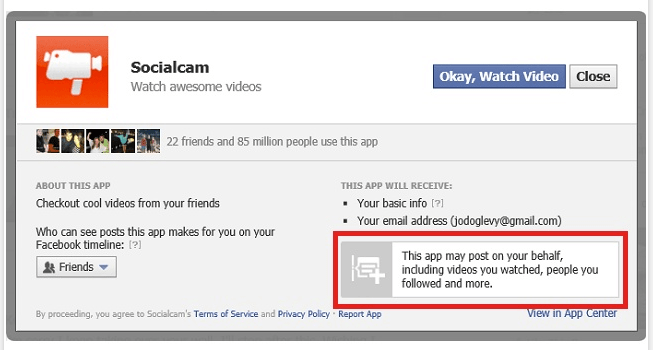A new Chrome plug-in that lets users bypass the installation of Facebook apps, but still consume the content your friends are sharing via those Facebook-enabled apps, has been picking up users at a solid clip since going live only a week ago. Facebook Open Graph Redirect, which works with Facebook apps for sites like SocialCam, Yahoo, the Washington Post and others, now has 3,200 users, and another developer has now used the same code to create a Firefox plug-in as well.
The growth of Open Graph Redirect is another example of how services that help you bypass some of the creeping effects of social media are hitting a chord with consumers: Brian Kennish, the ex-Googler developed Facebook Disconnect, a Chrome extension that disables traffic from third-party sites to Facebook servers but still allows you to access Facebook itself, tells me it now has over 700,000 weekly users, impressive growth considering that back in March it had 200,000 installs.
While Facebook Disconnect disrupts the usage traffic that gets sent by third-party sites to Facebook, Open Graph Redirect works in the opposite direction by disrupting activity within Facebook. Its purpose is twofold:
First, it lets users bypass the need to download an app themselves in order to be able to read content shared on an app by someone else. Joe Levy, the developer behind the service, says apps that the plugin would impact include Yahoo, Washington Post, MSNBC, SocialCam, the Guardian and Viddy.
“With a lot of users, it has a large potential to disrupt the ‘social reader’ auto-posting features of Facebook’s new Open Graph, as people will no longer need to install these apps in order to view the content ‘hidden’ behind their install buttons,” Levy tells me.
The second result of using the plugin is that you the user subsequently don’t have to share what you happen to be reading with others .
He tells me he’s not been in contact with Facebook about the plugin, and he acknowledges that Facebook probably wouldn’t be very happy about people installing it, but he also adds: “I’m not sure Facebook could shut down the plug-in.
“While it is probably against Facebook’s EULA to install this plug in, I think Facebook could only ban users using the plug in (if they really wanted to), but not cause Google to remove an extension from the Chrome Web Store that simply grabs HTML and modifies it.” He points to Facebook Disconnect’s continuing growth as “much more detrimental to Facebook than this.”
Kennish, meanwhile, notes that Facebook Open Graph Redirect is not the first to try to disrupt the social sharing features within Facebook. He points to an open source “side project” he did with Nik Cubrilovic (once an employee here at TechCrunch) called Frictionless (we wrote about it here) that has recently been updated by some contributors.
Facebook Disconnect has been updating, too, with an added feature on its Chrome and Safari plug-ins called Collusion, which Kennish says lets users visualize and, optionally, block all invisible websites that track you.
Levy says that his hope is that with Facebook Open Graph Redirect, if the plug-in gains more traction, Facebook and the websites whose apps “currently force users to install something that will have read/write access to their Facebook data will rethink the current way of doing things.” And that could potentially lead to a redesign of Open Graph and the “social reader” apps that would “better suit users.”
But if Levy sounds like he’s anti-Facebook, far from it: “I am a big fan of Facebook,” he tells me. He even flew out from his home in North Carolina to their offices a few months ago for a final round of interviews to work there.
“I do think these new open graph features and social readers are taking sharing a bit too far, especially considering all the privacy concerns people already have with Facebook,” he says. He points out that the plug-in has been enthusiastically received on Hacker News, Twitter, and AntyWeb. “If that has any correlation with how most Facebook users feel about Facebook’s social readers, then there is certainly a wide market for this extension, and certainly a number of things Facebook can improve upon in this area.”
